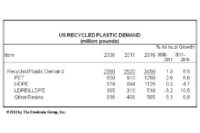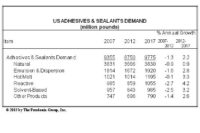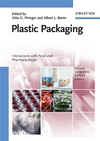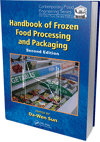US plastic film demand to reach 15.4 billion pounds

US demand for plastic film is expected to grow 1.5% per year through 2018 to 15.4 billion pounds, valued at $24.9 billion. Accelerating growth in manufacturing output and disposable incomes bodes well for plastic film sales in a wide range of markets. Expected price stabilization stemming from elevated plastic resin supply will improve the cost-competitiveness of plastic film versus other materials. Increased penetration of pouches into new markets will also boost demand for plastic film. These and other trends are presented in Plastic Film, a new study from The Freedonia Group, Inc. (freedoniagroup.com), a Cleveland-based industry market research firm.
Linear low density polyethylene (LLDPE) is the largest volume film resin, comprising 45% of total resin usage in 2013, and LLDPE will maintain solid growth through 2018. Analyst Spencer Hobson found that “low density polyethylene (LDPE) film demand will grow more slowly as it is replaced by LLDPE in some segments and reaches market maturity in many of its primary markets.” Above average growth is forecast for polypropylene film, driven by its use in packaging for the increasingly popular fresh produce market and its growth in snack food packaging. High density polyethylene (HDPE) film is expected to see minimal growth through 2018, with increasing opposition to single use plastic retail bags offsetting gains in food packaging markets. Polyethylene terephthalate film demand will post near average growth through 2018, with healthy gains in food packaging replacing demand from the declining magnetic tape and photographic film markets. Below average growth is expected for polyvinyl chloride (PVC), hampered by competition in nonfood applications such as pharmaceutical and medical products. Degradable plastic resins will experience the highest growth rate of all film types, with falling prices prompting packaging converters to adopt their use.
The food packaging market will exhibit the fastest growth in film demand, driven by the expanding popularity of pouches for a variety of food items, as well as the rise of active and intelligent packaging. Nonfood packaging will see solid growth stemming from strong demand for pharmaceutical and medical packaging. Slower growth is forecast for nonpackaging film due to the maturity of trash bag applications and the decrease in photographic and magnetic film, as these are only partially offset by robust advances for construction film. Secondary packaging will see the slowest gains, with flat or negative growth in garment bags and retail bags, although stretch film demand will benefit from a rebound in manufacturing activity.
Looking for a reprint of this article?
From high-res PDFs to custom plaques, order your copy today!








